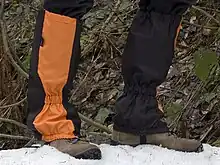gaiter
English

Etymology 1
Borrowed from French guêtre, from Middle French guiestres, guestes pl, from Old French *gueste, from Frankish *wastiju, from Proto-Germanic *wastijō (“garment; dress”).
Cognate with Middle High German wester (“a child's chrisom-cloth”), Middle High German westebarn (“godchild”), Old English wæstling (“a coverlet”), Gothic 𐍅𐌰𐍃𐍄𐌹 (wasti, “garment; dress”).
Pronunciation
- (Received Pronunciation) IPA(key): /ˈɡeɪ.tə/
Audio (Southern England) (file)
- (General American) IPA(key): /ˈɡeɪ.təɹ/
- Rhymes: -eɪtə(ɹ)
- Homophones: gater, gator
Noun
gaiter (plural gaiters)
- A covering of cloth or leather for the ankle and instep.
- Coordinate term: spats
- A covering cloth or leather for the whole leg from the knee to the instep, fitting down upon the shoe.
- 1897 December (indicated as 1898), Winston Churchill, chapter II, in The Celebrity: An Episode, New York, N.Y.: The Macmillan Company; London: Macmillan & Co., Ltd., →OCLC:
- Sunning himself on the board steps, I saw for the first time Mr. Farquhar Fenelon Cooke. He was dressed out in broad gaiters and bright tweeds, like an English tourist, and his face might have belonged to Dagon, idol of the Philistines.
- A neck gaiter.
- 2022 June 14, D. Jackson Leigh, Forever Comes in Threes, Bold Strokes Books Inc, →ISBN:
- [He] stood and pulled up the gaiter around his neck to mask his mouth and nose. “People are careful around here, so you'll want to put your mask on,” she told Perry.
- Part of the ecclesiastical garb of a bishop.
Derived terms
Translations
|
See also
Verb
gaiter (third-person singular simple present gaiters, present participle gaitering, simple past and past participle gaitered)
- To dress with gaiters.
Etymology 2
From Middle English gaytre, from Old English gāte-trēow (“the common dogwood”), equivalent to gāt (“goat”) + trēow (“tree”).
References
- “gaiter, n.2”, in OED Online
 , Oxford, Oxfordshire: Oxford University Press, launched 2000.
, Oxford, Oxfordshire: Oxford University Press, launched 2000. - Angus Cameron, Ashley Crandell Amos, Antonette diPaolo Healey, editors (2018), “gāte-trēow”, in Dictionary of Old English: A to I
 , Toronto: University of Toronto, →OCLC.
, Toronto: University of Toronto, →OCLC.
Catalan
Further reading
- “gaiter” in Diccionari de la llengua catalana, segona edició, Institut d’Estudis Catalans.
Old French
Conjugation
This verb conjugates as a first-group verb ending in -er. The forms that would normally end in *-ts, *-tt are modified to z, t. Old French conjugation varies significantly by date and by region. The following conjugation should be treated as a guide.
| simple | compound | ||||||
|---|---|---|---|---|---|---|---|
| infinitive | gaiter | avoir gaité | |||||
| gerund | en gaitant | gerund of avoir + past participle | |||||
| present participle | gaitant | ||||||
| past participle | gaité | ||||||
| person | singular | plural | |||||
| first | second | third | first | second | third | ||
| indicative | jo | tu | il | nos | vos | il | |
| simple tenses |
present | gait | gaites | gaite | gaitons | gaitez | gaitent |
| imperfect | gaitoie, gaiteie, gaitoe, gaiteve | gaitoies, gaiteies, gaitoes, gaiteves | gaitoit, gaiteit, gaitot, gaiteve | gaitiiens, gaitiens | gaitiiez, gaitiez | gaitoient, gaiteient, gaitoent, gaitevent | |
| preterite | gaitai | gaitas | gaita | gaitames | gaitastes | gaiterent | |
| future | gaiterai | gaiteras | gaitera | gaiterons | gaiteroiz, gaitereiz, gaiterez | gaiteront | |
| conditional | gaiteroie, gaitereie | gaiteroies, gaitereies | gaiteroit, gaitereit | gaiteriiens, gaiteriens | gaiteriiez, gaiteriez | gaiteroient, gaitereient | |
| compound tenses |
present perfect | present tense of avoir + past participle | |||||
| pluperfect | imperfect tense of avoir + past participle | ||||||
| past anterior | preterite tense of avoir + past participle | ||||||
| future perfect | future tense of avoir + past participle | ||||||
| conditional perfect | conditional tense of avoir + past participle | ||||||
| subjunctive | que jo | que tu | qu’il | que nos | que vos | qu’il | |
| simple tenses |
present | gait | gaiz | gait | gaitons | gaitez | gaitent |
| imperfect | gaitasse | gaitasses | gaitast | gaitissons, gaitissiens | gaitissoiz, gaitissez, gaitissiez | gaitassent | |
| compound tenses |
past | present subjunctive of avoir + past participle | |||||
| pluperfect | imperfect subjunctive of avoir + past participle | ||||||
| imperative | – | tu | – | nos | vos | – | |
| — | gaite | — | gaitons | gaitez | — | ||